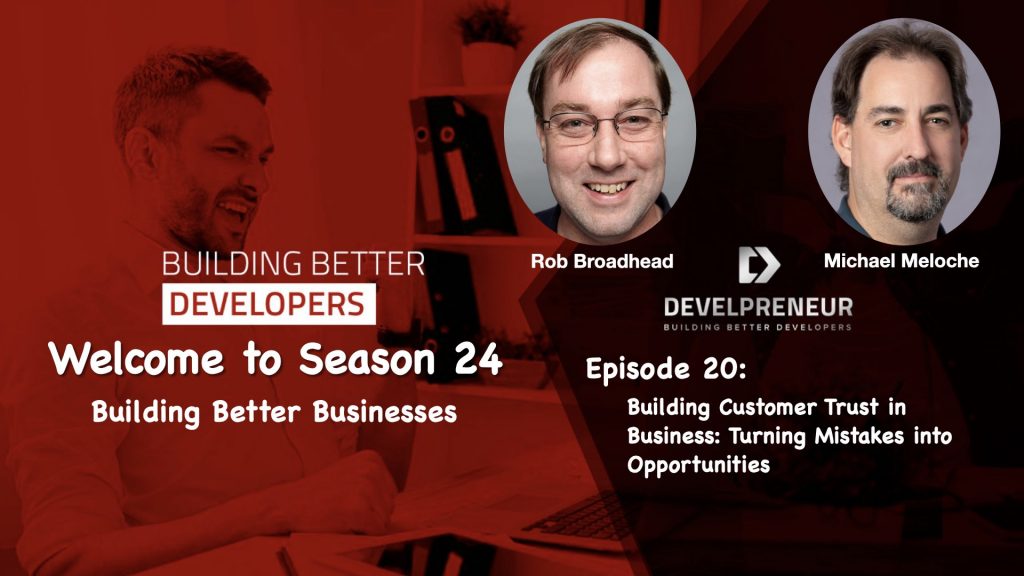In the latest Building Better Developers podcast episode, co-hosts Rob Broadhead and Michael Meloche discuss an uncomfortable but essential part of doing business: what to do when you make a mistake. More specifically, they explore how turning errors into opportunities can be a powerful tool for building customer trust in business, strengthening relationships, and creating long-term success.
🎧 Listen Now:
Why Building Trust Matters More Than Being Flawless
No business is perfect. Mistakes are part of growth. What truly separates successful companies is how they respond when things go wrong. Do they go silent—or step up?
“If you made the mistake, take ownership—and do what’s right for the customer.” – Michael Meloche
This episode focuses on real-world scenarios where transparency, integrity, and follow-through have proven to be the foundations for building customer trust in business.
💡 Strategy Highlight: Give More Than Just an Apology
Rob shares a case where he overlooked an email tied to a client’s active marketing campaign. The oversight wasn’t catastrophic, but it cost the client momentum.
Instead of brushing it off, Rob:
- Took responsibility
- Fixed the issue
- Forgave part of the invoice
Callout: Sometimes, the fastest way to earn loyalty is to share the burden—not just say “sorry.”
This approach showed that the client’s success mattered more than the billing cycle—strengthening trust in the process.
When Walking Away Is the Right Call
Trust also means knowing when a working relationship no longer serves either party. Michael discusses challenging situations where clients became hostile or manipulative.
In those cases, refunding invoices or ending the engagement was the best course of action. It preserved professionalism and set a boundary.
Tip: Customer communication strategies aren’t just about fixing things—they’re about knowing when to say “no more.”
The Foundation: Clear Agreements Build Stronger Trust
One major takeaway: Trust starts long before things go wrong. Clear contracts and expectations reduce the risk of confusion, disputes, or unrealistic assumptions.
Rob emphasizes the importance of outlining deliverables, rates, and support terms in writing and reviewing them with the client.
Pro Tip: Run your proposal through an AI tool and ask how a customer might interpret it. You’ll often uncover potential gaps or risks.
Flexible Payment as a Trust-Building Tool
Sometimes trust isn’t built in a single moment—it’s nurtured over time. Rob shares how creative billing, like “pay now, catch up later” or offering discounted hours, can show clients you’re invested in their success.
Callout: Trust grows when customers see you’re willing to meet them where they are—not just invoice them for where you want to be.
These thoughtful adjustments can help small businesses thrive while positioning you as a long-term partner, not just a vendor.
Building Customer Trust in Business Is a Choice
This episode of Building Better Developers reminds us that every mistake is a chance to earn more trust. Whether you’re waiving an invoice, offering a discount, or walking away respectfully, what matters most is how you show up.
Use strong customer communication strategies. Be transparent, kind, and fair. Most importantly, be accountable.
🎯 Episode Challenge: Audit Your Agreements
Rob leaves us with a practical challenge:
🔍 Review your current contracts and service agreements.
Ask yourself:
- Are your deliverables clearly defined?
- Do you specify what happens if something goes wrong?
- Is there language covering change requests or dispute resolution?
If you’re missing any of that—or don’t have written agreements—now’s the time to fix it. A firm contract protects you and helps build customer trust in business by setting clear expectations from day one.
Challenge Summary: Review and improve your contracts to better protect your business and strengthen client trust.

